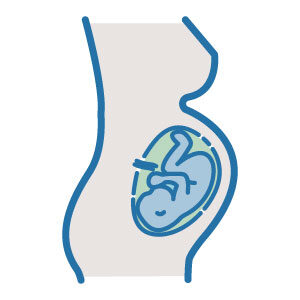MATERNAL CONDITIONS
 Pregnancy can worsen existing health problems. We monitor these conditions and recommend medications that can manage mom’s medical problems to minimize risks to the mother and baby. Some health conditions that may complicate a woman’s pregnancy are described below.
Pregnancy can worsen existing health problems. We monitor these conditions and recommend medications that can manage mom’s medical problems to minimize risks to the mother and baby. Some health conditions that may complicate a woman’s pregnancy are described below.
Advanced Maternal Age
Women 35 years or older are more likely to have a child born with a chromosomal problem such as Down syndrome. A detailed or level 2 ultrasound looks for signs of birth defects or markers that may suggest Down syndrome. A first-trimester screen is done between weeks 11 and 14 that includes a blood test and ultrasound. Women 40 years or older are also at a higher risk for developing gestational diabetes or preeclampsia, which can affect the baby’s growth and development during the pregnancy.
> MORE INFORMATION ON HAVING A BABY AFTER 35
> MORE INFORMATION ON GESTATIONAL DIABETES
Diabetes
Blood sugar that is not managed well in a pregnant woman with Type 1 or Type 2 diabetes could lead to problems. Good control of diabetes prior to becoming pregnant lowers the risk of birth defects, while good control during pregnancy decreases the chance of developing preeclampsia, early delivery, an overly large baby, or the necessity for a C-section.
> MORE INFORMATION
Hypertension
High blood pressure can place extra stress on the mother’s heart and kidneys and needs to be carefully monitored. Women with chronic high blood pressure risk preeclampsia, a complication that can cause damage to other organs, most often the liver and kidneys, and even cause seizures or strokes. Poor control of blood pressure can result in poor growth and development of the fetus. These complications can also lead to preterm delivery of the baby, which can result in more risks to the newborn infant.
> MORE INFORMATION
Autoimmune Diseases
Pregnancy affects different autoimmune disorders differently. For example, pregnancy can improve the mother’s disease in the case of rheumatoid arthritis while having no effect and/or worsening lupus. Medications prescribed for autoimmune conditions may need to be given to prevent a flare-up of the disorder. We review the risks of starting/resuming the medications against the risks of having an uncontrolled flare-up so that the woman and her autoimmune specialist can determine the best option for her pregnancy.
> MORE INFORMATION ON LUPUS
Anticoagulation
Blood clots form more easily during pregnancy, which most likely occurs to prevent heavy bleeding during childbirth. Treatment varies if a woman has had a blood clot in the past, has an underlying blood clotting disorder such as Factor V Leiden, or she develops a blood clot during pregnancy and needs to start on anticoagulation.
> MORE INFORMATION
Obesity
Obesity is defined as having a body mass index of 30 or higher. Obesity during pregnancy places a woman at higher risk of developing gestational diabetes and preeclampsia, which can also affect the health and well-being of the baby. There is also a higher risk of birth defects including spina bifida.
> MORE INFORMATION
Thyroid Disorder
An underactive (hypothyroid) or overactive (hyperthyroid) thyroid can affect the health of the mother and the baby during pregnancy. Poor control of the thyroid can lead to a higher risk of miscarriage, preterm delivery, preeclampsia, fetal growth restriction, and poor brain development of the baby. Frequent monitoring of a woman’s thyroid levels is needed to make sure she is getting enough medication to keep her thyroid levels steady.
> MORE INFORMATION ON HYPOTHYROIDISM
> MORE INFORMATION ON HYPERTHYROIDISM
